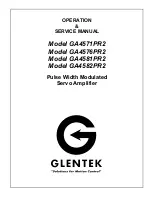
GLENTEK Inc. 208 Standard Street, El Segundo, California 90245, U.S.A. (310) 322-3026
10
GA45-71PR2/76PR2/81PR2/82PR2 MANUAL
3. High-Speed Electronic Circuit Breaker (HS/ECB) triggered.
4. Low-Speed Electronic Circuit Breaker (LS/ECB) triggered (Does not light Inhibit LED).
5. Low-voltage power-supply under-voltage condition.
The Drive-Inhibit indicator light will also turn ON and OFF with the Total-Inhibit input signal (TB201-10).
This is a non-latched and non-fault condition. When the Inhibit indicator is ON, all output current is re-
moved from the motor. After removing the cause of the fault, the fault latch may be reset by depressing
the Reset pushbutton located on the control card, or by applying an appropriate signal to the external
reset input (TB201-11) (see “Logic” inputs, section 2.2.3).
2.3.3 TACH-LOSS INDICATOR (RED LED) AND RELAY OPERATION:
When the Tach input voltage (TB201-5) falls below the level set by potentiometer R32 at TP20 while
the motor current is above the level set by potentiometer R36 at TP21 for more than 32 milliseconds, the
Tach-Loss indicator light (D26) will turn ON and the Tach-Loss relay (K2) will energize. This is a latched
condition. A loss of Tach voltage will also remove the “Moving” output (active low) from TB202-1. This is a
non latched condition.
2.3.4 HIGH-SPEED ELECTRONIC CIRCUIT BREAKER (RED LED):
The HS/ECB LED
indicator light (D28) will turn ON and latch, indicating that the High-Speed Electronic
Circuit Breaker (HS/ECB) has fired. This circuit protects the amplifier from dead shorts across the amplifier
output terminals. The HS/ECB is always factory set and should not be adjusted.
2.3.5 POWER SUPPLY MONITOR:
This circuit will generate an inhibit if the on-board, low-voltage power supplies can not maintain
proper operating voltages. This is a non-latched condition.
2.3.6 LOW-SPEED ELECTRONIC CIRCUIT BREAKER (RED LED):
The LS/ECB LED indicator light (D27) will turn ON and latch indicating that the Low-Speed Elec-
tronic Circuit Breaker (LS/ECB) has fired. This circuit protects the motor, amplifier, and mechanical system
from damage due to excessive mechanical bind in the system or possibly driving into a hard mechanical
stop. Circuit operation is as follows:
When the motor current exceeds the value set by potentiometer R50 at TP25 (the setting of which
varies with the model), U10D switches positive and the voltage on C33 begins integrating up. If the current
remains above the set point, typically 1.5 seconds, U9B will trigger the LS/ECB latch.
Note that this fault acts differently than any other fault in that it does not inhibit the output current.
Instead, it commands a zero current input to the current-loop summing amplifier (see Theory of Operation,
chapter 4). Also it does not light the Inhibit indicator (Since it does not “inhibit” the motor current).
See section 2.3.1 on the clearing of the fault latch.
2.3.7 DC BUS VOLTAGE REGEN’ CLAMP & RESISTOR:
These components are mounted on the base-plate. They function to keep DC Bus voltage surges
below a safe level, protecting the amplifier and DC Bus capacitor from over-voltage.
2.3.7 VELOCITY-TAPER CURRENT-LIMIT:
Motor specifications often include SOA (Safe Operating Area) curve which is the maximum motor cur-
rent as a function of RPM. (See figure 2.3.7.) The optional VTCL (Velocity-Taper Current-Limit) ensures
that the maximum available motor current is within SOA limits. Below maximum, the motor is still controlled
by the velocity-error (or current-command) signal. The VTCL may decrease the rate of acceleration and
deceleration. Consult a Glentek applications engineer before ordering.










































